Demolition Contractors Kirkstall
Top Demolition Experts in Kirkstall
Receive up to 3 Demolition Companies quotes for your project today! Compare profiles, reviews, accreditations, portfolio, etc... and choose the best deal.
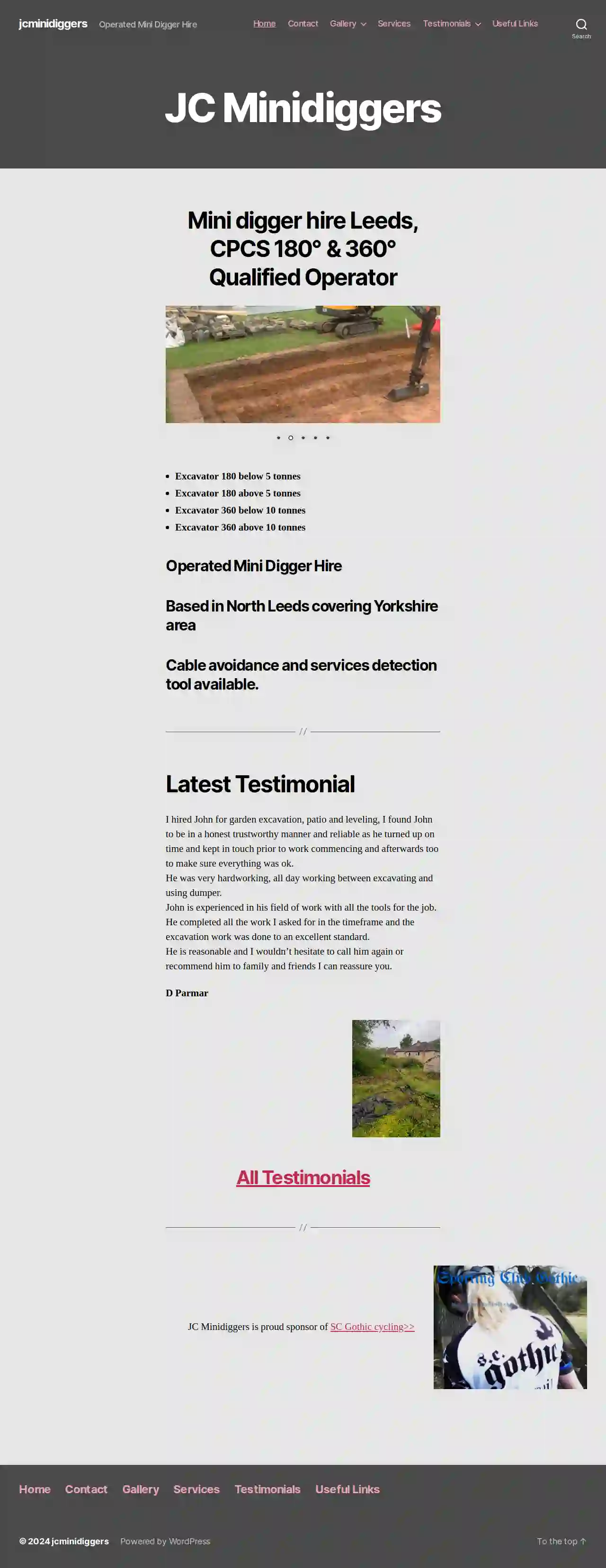
JC Minidiggers
52 reviewsLeeds, GBJC Minidiggers: Your Reliable Mini Digger Hire Partner in Leeds JC Minidiggers is a trusted name in mini digger hire across Leeds and Yorkshire. We offer a comprehensive range of services, from excavations and driveways to landscaping and site clearance. Our experienced and qualified operators are dedicated to delivering high-quality work, ensuring your project is completed on time and within budget. We understand the importance of reliability and professionalism. That's why we prioritize clear communication, punctuality, and meticulous attention to detail. Our commitment to customer satisfaction is evident in our numerous positive testimonials, showcasing our dedication to exceeding expectations. Whether you're a homeowner tackling a DIY project or a contractor working on a large-scale development, JC Minidiggers is your go-to partner for efficient and reliable mini digger hire. Contact us today to discuss your project and receive a free, no-obligation quote.
- Services
- Why Us?
- Testimonials
- Gallery
Get Quote
Deluxe Build Developments Ltd
58 reviewsLeeds, GBAt Deluxe Build Developments we pride ourselves on delivering exceptional high-quality construction services, complemented by a commitment to excellent customer service. We Are setting new benchmarks for luxury living At Deluxe Build Developments our mission is to redefine excellence in the construction industry, setting the standard for high-end craftsmanship and superior quality. With an unwavering commitment to delivering the utmost in customer satisfaction. Our Capabilities We combine our decades of expertise with a passion for exceeding expectations. From concept to completion, we manage all aspects of new construction projects, ensuring quality craftsmanship and timely delivery. We specialize in building custom homes, extensions, and renovations to suit our clients’ unique needs and preferences. At Deluxe Build Developments we are passionate about our work and dedicated to achieving excellence in everything we do. About Us From concept to completion, we strive to provide unparalleled service, ensuring every project reflects our dedication to excellence and attention to detail.
- Services
- Why Us?
- Gallery
Get Quote
Foxhall Environmental
539 reviewsOwler Ln, Birstall, WF17 9BW, GBFoxhall – Trusted Waste Solutions Operating throughout the UK, Foxhall Environmental has built a reputation over the last 10 years for delivering exceptional standards of service across our domestic and commercial waste management solutions. Flexibly Foxhall How our waste solutions work Focusing on your unique requirements, we provide flexible, efficient, compliant and cost-effective collection, disposal and recycling services for a vast range of hazardous and non-hazardous waste. As a fully independent waste company with our own robust fleet and team of experienced professionals, we pride ourselves on our effective processes and innovative solutions – all designed to benefit your business. Key benefits Why trust our waste solutions experts? With our ISO 9001 quality management system and professional accreditations, you can be confident in our exceptional standards for your peace of mind. Our waste solutions cover customers across Yorkshire and the whole of the UK – with 24/7 emergency support all part of the service. We’re there when you need us. We promise to collect and dispose of your waste, deliver your waste collection units or provide any support you need within 48 hours of placing your order – no compromises.
- Services
- Why Us?
- Accreditations
- Testimonials
- Gallery
Get Quote
Groundforce Shorco
4.47 reviewsCentral House, Beckwith Knowle, Otley Road, Harrogate, HG3 1UD, GBGroundforce: Your Partner in Safety and Efficiency Groundforce is a leading provider of shoring, piling, and excavation safety solutions. We offer a wide range of products and services to meet the needs of our customers in the construction, infrastructure, and utilities sectors. Our commitment to safety and efficiency is reflected in everything we do, from the design and manufacture of our products to the training we provide to our customers. Our History Groundforce has been in business for over 50 years, and we have a long history of providing innovative and reliable solutions to our customers. We are constantly investing in research and development to ensure that our products and services are at the forefront of the industry. Our Mission Our mission is to provide our customers with the safest and most efficient solutions possible. We are committed to providing our customers with the highest level of service and support. We believe that our customers are our most valuable asset, and we are dedicated to building long-term relationships with them. Our Team Our team is made up of experienced professionals who are passionate about safety and efficiency. We are committed to providing our customers with the best possible experience. We are always available to answer your questions and provide you with the support you need.
- Services
- Why Us?
- Accreditations
- Gallery
Get Quote
Mone Bros Excavation Ltd
4.658 reviewsBlackhill Quarry, Kings Rd, Leeds, West Yorkshire, LS16 8BG, GBMone Bros: Your One-Stop Shop for Landscaping and Building Products Mone Bros is a family-run business with over 55 years of experience in providing high-quality landscaping and building products. We're passionate about helping our customers create beautiful and functional outdoor spaces, and we're committed to providing excellent customer service. Our story began in 1965 when brothers Phil, James, and John Mone founded the business, specializing in plant equipment maintenance, repair, and hire for the construction industry. Their success in serving the growing housing development in Leeds during the 1970s led them to acquire Blackhill Quarry in 1979, marking their entry into the aggregates and stone products market. Over the years, Mone Bros has expanded its portfolio of landscaping and building products. While our initial focus was on supplying products and services to the construction and utility sectors, we now cater to a wider audience, including DIY enthusiasts, property developers, and landscapers. Our Blackhill Quarry boasts the largest landscaping product display garden in the area, offering a wide selection of porcelain and natural stone paving, pebbles, sand, decorative gravels, topsoil, hardcore, and core building materials for all your landscaping needs. In 1987, Mone Bros launched recycling services from Blackhill Quarry, focusing on recycling construction waste and reducing landfill waste. The success of this initiative led to the launch of the same service from our Whitehall Road depot a year later. Our recycling process involves collection, segregation, crushing, screening, and certification, resulting in various reusable recycled products, including recycled type 1 and sub-base materials.
- Services
- Why Us?
- Testimonials
- Gallery
Get Quote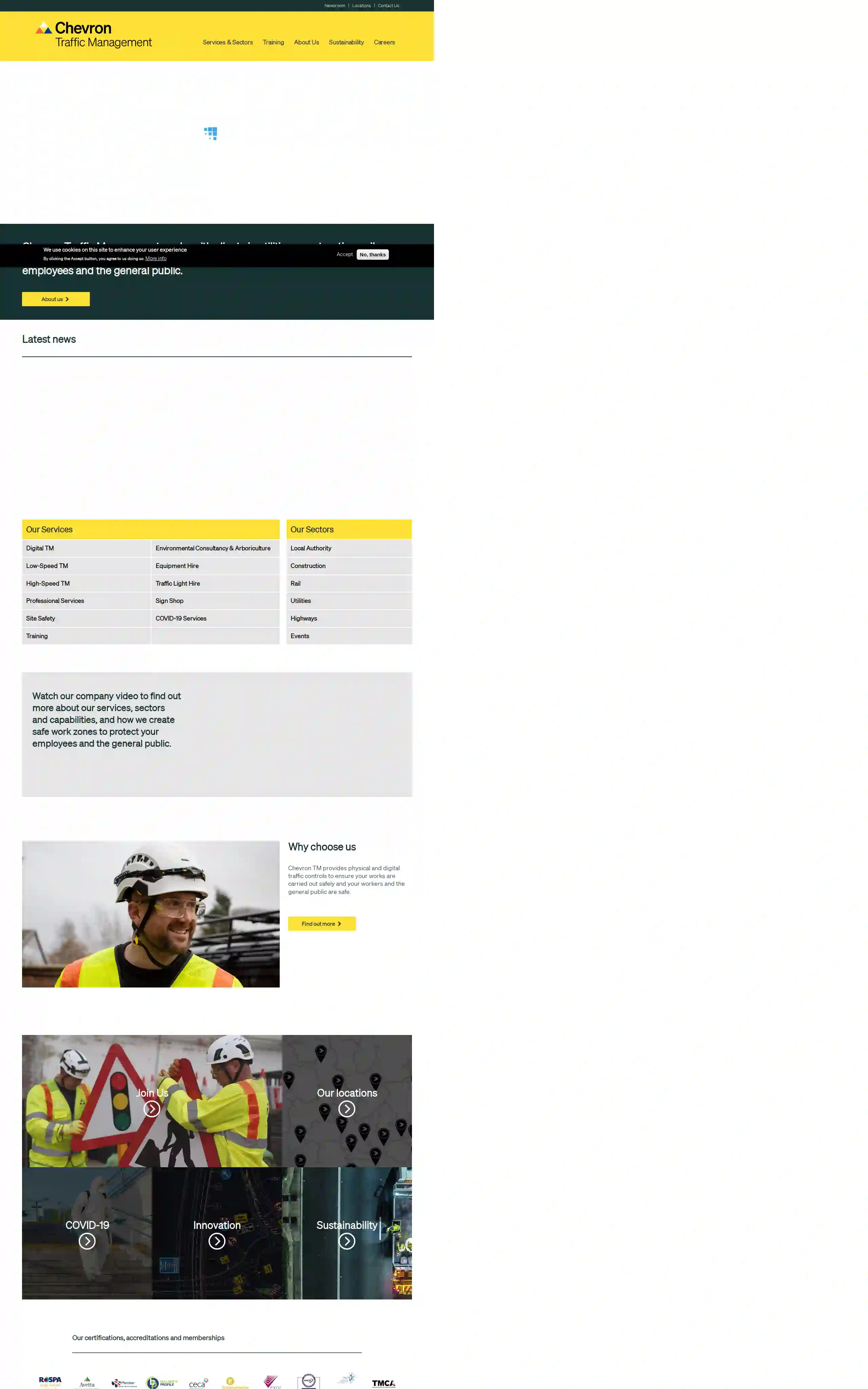
Chevron Traffic Management | Leeds
4.25 reviews141-149 Salisbury House, London Wall, 141-149 Salisbury HouseLondon WallLondon, London, EC2M 5QQ, GBAbout Chevron TM Chevron TM provides physical and digital traffic controls to ensure your works are carried out safely and your workers and the general public are safe. We manage traffic for organisations working within Utilities, Construction, Rail, High-Speed Network, Local Authorities and Events which need to disrupt normal traffic flow to complete a project. Why Choose Us We believe our employees are the best in our business. They are ambitious, hard-working, dedicated and are proud to work for Chevron TM. We are proud of them and the contribution they make to the success of our company and to ensuring that we are the UK’s leading independent traffic management company.
- Services
- Why Us?
- Gallery
Get Quote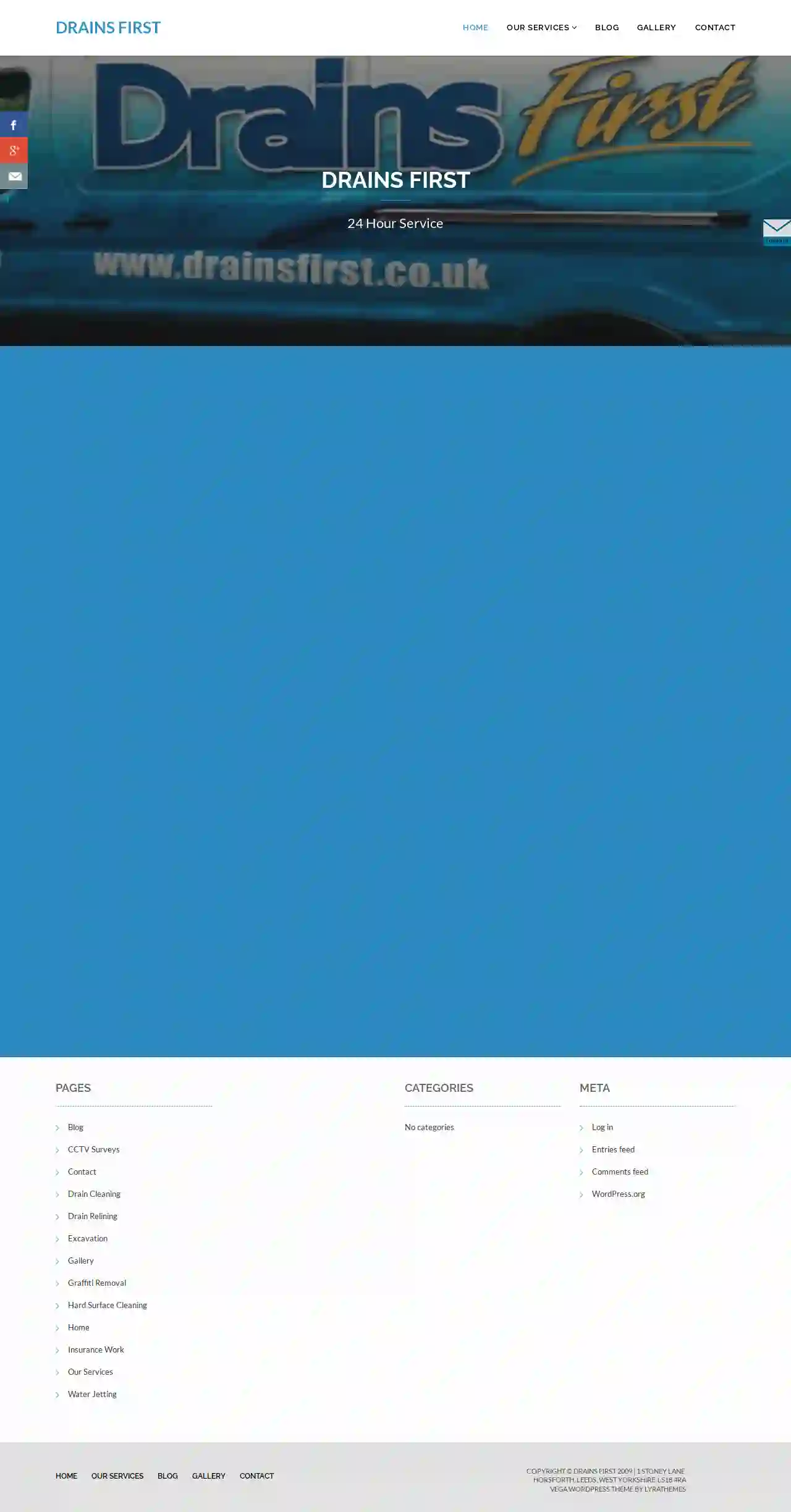
Drains First Ltd
4.824 reviews1 Stoney Lane, Horsforth, Leeds, West Yorkshire, LS18 4RA, GBDrains First provides emergency and planned maintenance service to commercial and domestic clients. We have over 30 years experience in drain maintenance and drain repair, all our technicians are friendly and professional, our methods are modern and efficient. We have a full range of modern drain cleaning equipment capable of cleaning any pipes and drains from a household sink to a 12″ sewer. All our vehicles are fitted with on board High Pressure Water Jetting Machines. Water jetting allows us to use high pressure water jets to clear blocked drains without the need for chemicals that can damage the environment. Drains First are specialists in CCTV surveys of drains, our highly qualified technicians can quickly identify problems such as blockages and damage without the need to dig into the ground to inspect the drain. Our engineers are extremely experienced in relining and excavation work with minimal disruption to the customer. Graffiti is an on going problem that can be unsightly, graffiti can be cleaned from most surfaces with the best possible results without unnecessary shadows. For examples of our work please visit our gallery.
- Services
- Why Us?
- Gallery
Get Quote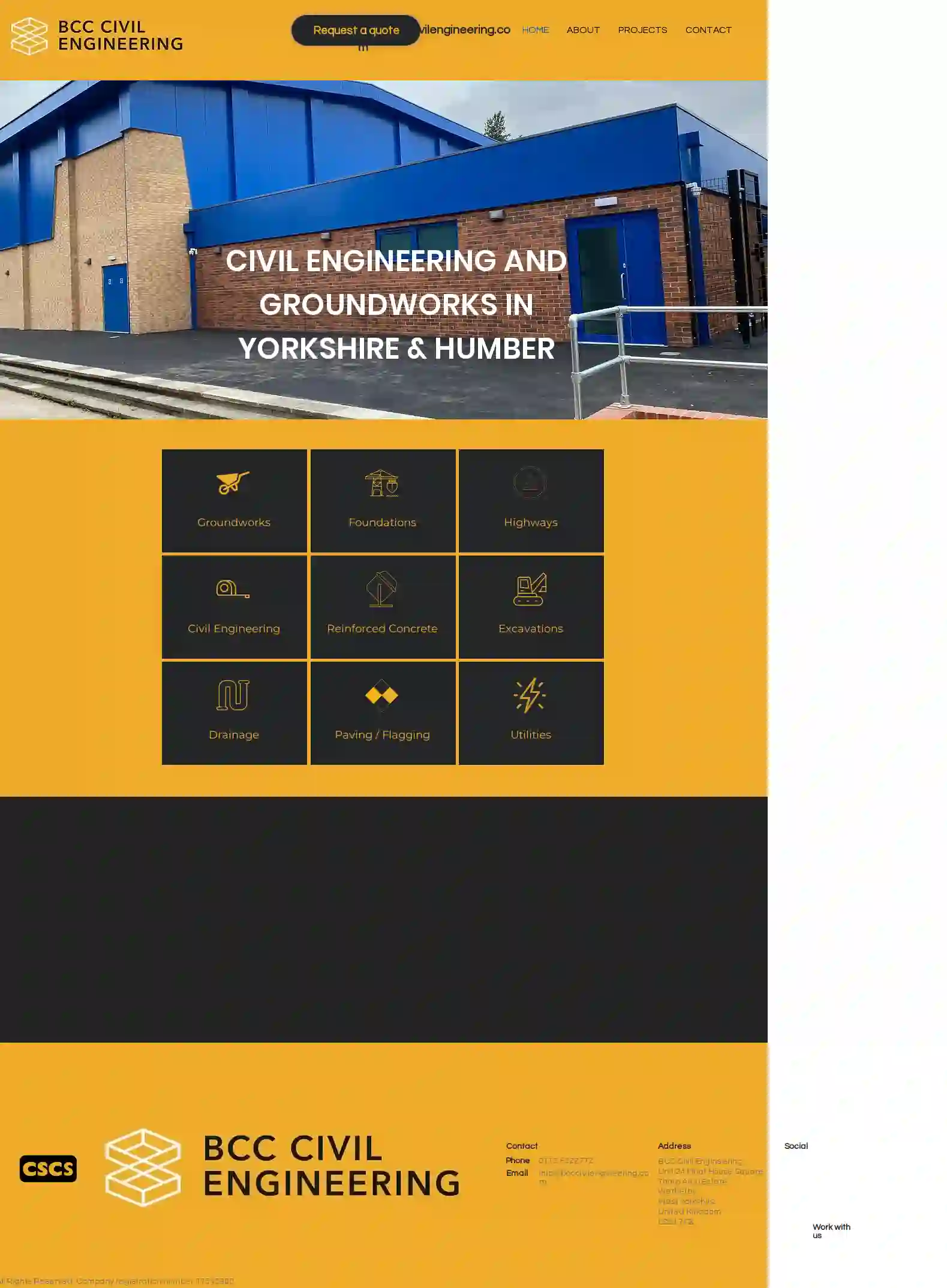
BCC Civil Engineering Ltd
53 reviewsUnit 24 Moat House Square, Thorp Arch Estate, Unit 24 Moat House Square Thorp Arch Estate Wetherby West Yorkshire United Kingdom, Wetherby, LS23 7FB, GBBCC Civil Engineering: Your Trusted Partner for Quality Civil Engineering and Groundworks in Yorkshire & Humber At BCC Civil Engineering, we are committed to delivering exceptional civil engineering and groundworks services across Yorkshire & Humber. With a focus on quality, reliability, and customer satisfaction, we have established ourselves as a leading provider in the region. Our team of experienced professionals possesses a deep understanding of the industry and a passion for delivering projects to the highest standards. We are equipped with the latest technology and resources to handle projects of all sizes, from small-scale residential developments to large-scale commercial and infrastructure projects. We take pride in our comprehensive range of services, including: • Highways • Excavations • Utilities • Foundations • Reinforced Concrete • Paving / Flagging • Groundworks • Civil Engineering • Drainage Our commitment to quality is reflected in our unwavering dedication to safety, environmental responsibility, and client satisfaction. We work closely with our clients to understand their specific needs and deliver projects that meet their expectations and exceed their requirements. Whether you are a homeowner, developer, or contractor, BCC Civil Engineering is your trusted partner for all your civil engineering and groundworks needs. Contact us today to discuss your project and experience the difference that quality makes.
- Services
- Why Us?
- Gallery
Get Quote
M3 Groundworks Ltd
Unit E2, Lotherton Business Park, Lotherton Way, Garforth, Leeds, West Yorkshire, England, Lotherton Business Park Lotherton Way, LS25 2HP, GBExperienced Groundwork Contractor in Leeds M3 Groundworks Ltd is an experienced civil engineering and groundwork contractor covering Leeds and the surrounding areas of Yorkshire. Quality groundwork services Covering Yorkshire, M3 Groundworks Ltd is based in Leeds and works across the Yorkshire region. We are experienced civil engineers and groundwork contractors, able to undertake a variety of projects, ranging from private dwellings to public and commercial new builds or refurbishment contracts. Our team's extensive skills and experience in groundworks and construction, together with the latest plant and machinery, enables us to offer and deliver the quality and service you require. Our experienced and dedicated management team are here to help and will discuss every aspect of your project, ensuring you are satisfied with your project from inception to completion.
- Services
- Why Us?
- Testimonials
- Gallery
Get Quote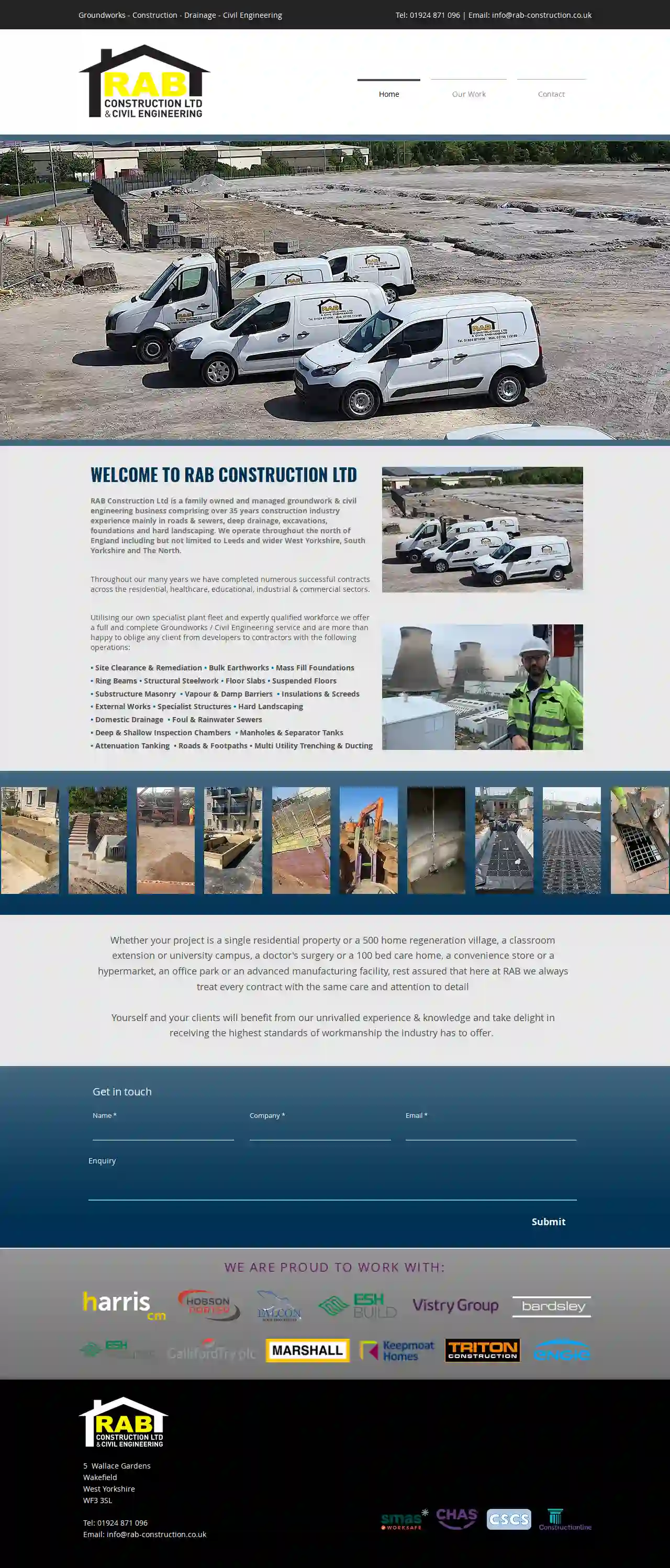
RAB Construction Ltd
11 reviews5 Wallace Gardens, Wakefield, WF3 3SL, GBWELCOME TO RAB CONSTRUCTION LTD RAB Construction Ltd is a family owned and managed groundwork & civil engineering business comprising over 35 years construction industry experience mainly in roads & sewers, deep drainage, excavations, foundations and hard landscaping. We operate throughout the north of England including but not limited to Leeds and wider West Yorkshire, South Yorkshire and The North. Throughout our many years we have completed numerous successful contracts across the residential, healthcare, educational, industrial & commercial sectors. Utilising our own specialist plant fleet and expertly qualified workforce we offer a full and complete Groundworks / Civil Engineering service and are more than happy to oblige any client from developers to contractors with the following operations: Site Clearance & Remediation Bulk Earthworks Mass Fill Foundations Ring Beams Structural Steelwork Floor Slabs Suspended Floors Substructure Masonry Vapour & Damp Barriers Insulations & Screeds External Works Specialist Structures Hard Landscaping Domestic Drainage Foul & Rainwater Sewers Deep & Shallow Inspection Chambers Manholes & Separator Tanks Attenuation Tanking Roads & Footpaths Multi Utility Trenching & Ducting Whether your project is a single residential property or a 500 home regeneration village, a classroom extension or university campus, a doctor's surgery or a 100 bed care home, a convenience store or a hypermarket, an office park or an advanced manufacturing facility, rest assured that here at RAB we always treat every contract with the same care and attention to detail. Yourself and your clients will benefit from our unrivalled experience & knowledge and take delight in receiving the highest standards of workmanship the industry has to offer.
- Services
- Why Us?
- Gallery
Get Quote
Over 13,059+ Excavation Contractors on our directory
Our excavation experts operate in Kirkstall & surroundings!
ExcavationHQ has curated and vetted Top Excavation Businesses in Kirkstall. Find a reliable contractor today.
Frequently Asked Questions About Demolition Contractors
- General Liability Insurance: Covers bodily injury or property damage to third parties caused by the contractor's negligence.
- Workers' Compensation Insurance: Provides benefits to workers injured on the job.
- Pollution Liability Insurance: Covers costs associated with environmental contamination caused by demolition activities.
- Professional Liability Insurance: Protects against claims of negligence or errors in professional services, such as demolition planning or consulting.
- Site Security: Secure the demolition site with fencing and warning signs to prevent unauthorized access.
- Personal Protective Equipment (PPE): Workers should wear appropriate PPE, including hard hats, safety glasses, gloves, and steel-toe boots.
- Hazardous Material Removal: Properly identify and remove asbestos, lead paint, or other hazardous materials before demolition begins.
- Utility Disconnections: Disconnect all utilities, such as electricity, gas, and water, before demolition.
- Controlled Demolition Techniques: Employ controlled demolition methods to minimize risks and ensure the structure comes down safely.
- Dust Control: Implement dust suppression measures, such as water spraying or misting, to reduce airborne particles and protect air quality.
- Emergency Planning: Have an emergency plan in place, including communication protocols and evacuation procedures, in case of unforeseen events.
What is the importance of insurance in demolition projects?
What is a demolition bond?
Do I need a permit for demolition?
What are the safety precautions for demolition?
What is the importance of insurance in demolition projects?
- General Liability Insurance: Covers bodily injury or property damage to third parties caused by the contractor's negligence.
- Workers' Compensation Insurance: Provides benefits to workers injured on the job.
- Pollution Liability Insurance: Covers costs associated with environmental contamination caused by demolition activities.
- Professional Liability Insurance: Protects against claims of negligence or errors in professional services, such as demolition planning or consulting.
What is a demolition bond?
Do I need a permit for demolition?
What are the safety precautions for demolition?
- Site Security: Secure the demolition site with fencing and warning signs to prevent unauthorized access.
- Personal Protective Equipment (PPE): Workers should wear appropriate PPE, including hard hats, safety glasses, gloves, and steel-toe boots.
- Hazardous Material Removal: Properly identify and remove asbestos, lead paint, or other hazardous materials before demolition begins.
- Utility Disconnections: Disconnect all utilities, such as electricity, gas, and water, before demolition.
- Controlled Demolition Techniques: Employ controlled demolition methods to minimize risks and ensure the structure comes down safely.
- Dust Control: Implement dust suppression measures, such as water spraying or misting, to reduce airborne particles and protect air quality.
- Emergency Planning: Have an emergency plan in place, including communication protocols and evacuation procedures, in case of unforeseen events.